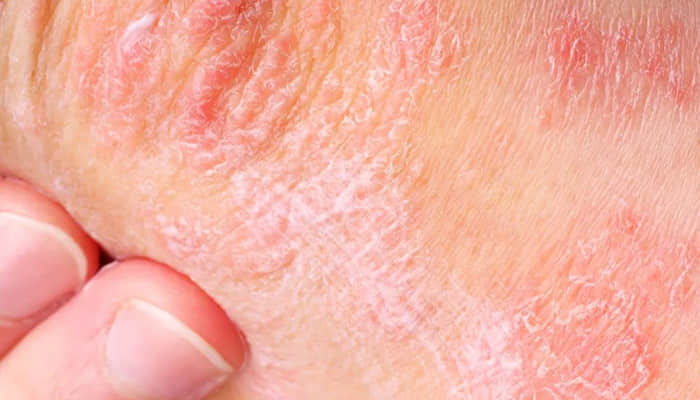
Psoriasis treatments
Psoriasis treatments are numerous and very varied in terms of the active ingredient, dosage form, and route of administration. A person with psoriasis very often uses different treatments throughout their treatment. It all depends on the extent of the lesions, the frequency of flare-ups, the impact on daily life, and the quality of life.
Types of Treatments for Psoriasis

The first treatments to consider are local. Topical corticosteroids have been used for several decades in treating flare-ups, but their bad reputation is frightening. However, they have nothing to do with corticosteroids taken systemically for months or even years. Topical corticosteroids have some local side effects but are generally very well tolerated following the medical prescription. Vitamin D derivatives are also often used, alone or in combination with topical corticosteroids. Here again, they are well tolerated, except for some skin irritation at the start of treatment.
Oral treatment
Several treatments for psoriasis are taken orally. Among them is methotrexate. This medication limits cell proliferation in psoriasis but also in other inflammatory diseases. It is administered orally or injectable, once a week. Cyclosporine is an immunosuppressive medication initially intended to limit the risk of rejection during an organ transplant. Two other molecules are available although less used: acitretin and apremilast.
Biotherapies

Biotherapies are probably the most talked about class of drugs in the treatment of psoriasis today. Quite simply because they have revolutionized the management of this disease, both in its cutaneous and articular forms. Biotherapies come in the form of injections, once or several times a month depending on the protocols. New biotherapies come out regularly and provide relief to many patients. However, biotherapies are intended for moderate to severe psoriasis, which has a significant impact on the quality of life of patients.
Phototherapy
Phototherapy is a medical technique on the borderline between local and general treatments. It is based on the beneficial, anti-inflammatory, and immunosuppressive effects of ultraviolet rays (known as UV) on psoriasis plaques. Beneficial effects that many people with psoriasis can see during the summer season when radiation increases. Phototherapy is only considered under medical supervision and in the form of short courses.
Thermal cures
Thermal cures can be suggested by the doctor during the treatment of psoriasis to relieve the patient. Some thermal waters are known to be anti-inflammatory and soothing, they will act on the skin of the spa guest at the same time as on his mind. Indeed, a thermal cure is often an opportunity to relax, to learn how to take better care of yourself, to meet other people suffering from the same skin disease.
Complementary treatments

At the same time, many additional/complementary treatments, also called natural psoriasis treatments, are available without a prescription in pharmacies or on the Internet. The best-known natural treatments are based on homeopathy and aromatherapy, but there is also herbal medicine, probiotics, micronutrition, etc. At the same time, appointments are made in osteopathy, sophrology, hypnosis, acupuncture, etc. For what results? It all depends.
In some cases, the effectiveness is interesting to complement the treatment prescribed by the doctor. In other cases, nothing changes. So what to do? Try everything? Give up? The most reasonable thing would be to move towards the therapies that suit us best, without it taking too much time or committing too much budget.
Psoriasis treatments are so varied that it is sometimes difficult to find your way around. In all cases, four points are essential:
- Psoriasis treatments are not definitive but only symptomatic. They are effective in relieving flare-ups but do not resolve the underlying immune and skin problems. No treatment can completely and permanently “cure” or “get rid of” psoriasis.
- Psoriasis treatments must be followed correctly, otherwise they will be ineffective. We do not apply our cream or take our pill whenever we want!
- Psoriasis treatments vary in effectiveness from person to person, because all psoriasis is different. But don’t panic! There are solutions and another treatment should be tried in agreement with the dermatologist.
- Psoriasis treatments must be accompanied by daily hygiene and care measures: in particular, washing and moisturizing the skin with gentle products suitable for pathological skin.
